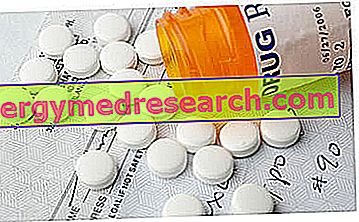drugs
To learn more: Drugs for the treatment of Alzheimer's disease
At the present state of medical knowledge, the treatment of Alzheimer's disease does not include a causal drug therapy, that is to say that it affects the cause of the disease, but uses symptomatic pharmacological therapies, whose purpose is to slow down the manifestations pathology clinics.
The drugs approved and present on the market today can be divided into:
- medications for Alzheimer's disease;
- drugs for behavioral disorders.

Acetylcholinesterase inhibitors
In the mild and moderate phase of Alzheimer's disease, acetylcholinesterase inhibitors (the enzyme that degrades acetylcholine, the neurotransmitter responsible for cholinergic transmission) are used. These drugs increase cholinergic transmission (which is reduced in individuals suffering from Alzheimer's disease), delaying the degradation of acetylcholine.
Acetylcholine is an important neurotransmitter in the process of memory formation and maintenance, which are compromised and eventually degenerate as Alzheimer's disease progresses.
Acetylcholinesterase inhibitors maintain the availability of acetylcholine in the brain and can compensate, but not stop, the destruction of cells caused by the disease.
Some symptoms may improve:
- cognitive: what memory and attention;
- behavioral: apathy, agitation and hallucinations.
Unfortunately this capacity decreases with the progression of the disease.
The anticholinesterase drugs approved by the American Food and Medicines Agency (FDA) are:
- Tacrina (not available in Italy)
- Donepezil
- Rivastigmine
- galantamine
One of the first drugs used to treat Alzheimer's disease was tacrine, known under the trade name Cognex ®, approved in 1993 by the FDA. Although this drug is capable of leading to an improvement in cognitive functions, its side effects, particularly affecting the liver, make it a non-first-choice drug.
More recently, however, there is donepezil, better known under the trade name Aricept ®, which thanks to its half-life [pharmacokinetic parameter that indicates the time required to reduce the amount of a drug in plasma or serum by 50% ( in the blood)] of about 70 hours, allows a single daily administration. The donepezil acts in the initial phase of the disease, when it is still considered light or moderate. At this stage the cognitive symptoms are still mild and the patient's daily life is not yet compromised.
Rivastigmine, also known as Exelon ®, is also used for Alzheimer's disease, and has been shown to act more in brain areas such as hippocampus and bark.
One of the drugs, which always belongs to the more recent class of acetylcholinesterase inhibitors, is galantamine, approved by the FDA in 2001. This molecule is known under the trade name of Reminyl ®, and is a natural alkaloid found in family plants Amaryllidaceae, particularly in the Galanthus Nivalis . Since its discovery, galantamine has been used to treat myasthenia gravis (muscle weakness) and other neuromuscular diseases. Due to its ability to cross the blood-brain barrier (at the level of the central nervous system) and to selectively inhibit acetylcholinesterase, its use has been suggested in the treatment of Alzheimer's disease. It is a long-lasting drug with activity in the central nervous system, free of liver toxicity and with moderate side effects, similar to that of other acetylcholinesterase inhibitors. Cases have been observed in which the administration of galantamine induced an increase in the mnemonic capacities of the treated subjects, leading to a reduction in cognitive damage.
The picture of drugs that belong to acetylcholinesterase inhibitors, therefore, involves the use of donepezil, rivastigmine and galantamine, which are better tolerated than the use of tacrine.
Acetylcholinesterase inhibitors are more effective when used immediately after the diagnosis of Alzheimer's disease. As for the dosage, for each of them we start with a low dose and then adapt it to each individual patient based on the tolerability of the side effects and improvements, observing a period ranging from one to six months. The adverse effect profile of different acetylcholinesterase inhibitors is similar, and includes gastrointestinal effects including nausea, vomiting, weight loss; neurological effects including insomnia, headache, dizziness, sweating.
The choice of one or the other drug depends on the doctor and varies from individual to individual.
Memantine
Memantine, better known as Ebixa ® (trade name), is the latest drug approved by the FDA for the treatment of Alzheimer's disease. It is a drug particularly suitable for moderate to severe to severe illness.
Memantine works by compensating for the toxic effects deriving from the excessive excitation of nerve cells induced by glutamate, a fundamental neurotransmitter for learning and memory processes. An excessive amount of glutamate, however, leads to neuronal toxicity resulting in neuronal death due to the excess of calcium that accumulates inside the neuron. Memantine, acting at the level of the NMDA receptor, one of the glutamate receptors, acts as a non-competitive antagonist, thus protecting nerve cells and preventing excessive glutamate release.
Memantine has been shown to be effective when used either as monotherapy or as an add-on to acetylcholinesterase inhibitors. The most common therapeutic strategy involves the initial use of acetylcholinesterase inhibitors; in a second period, when the patient begins to show further signs of cognitive decline, memantine-based therapy is also associated.



